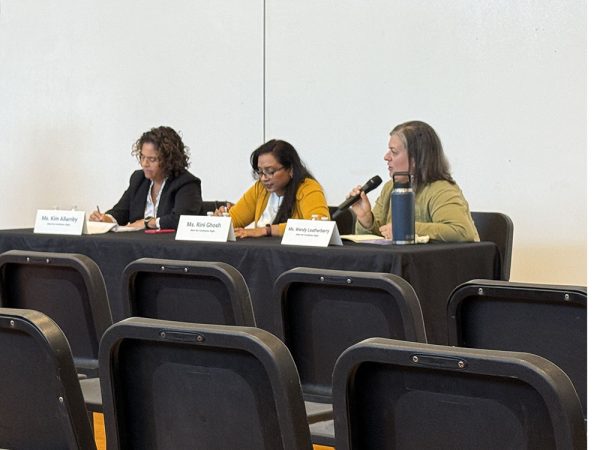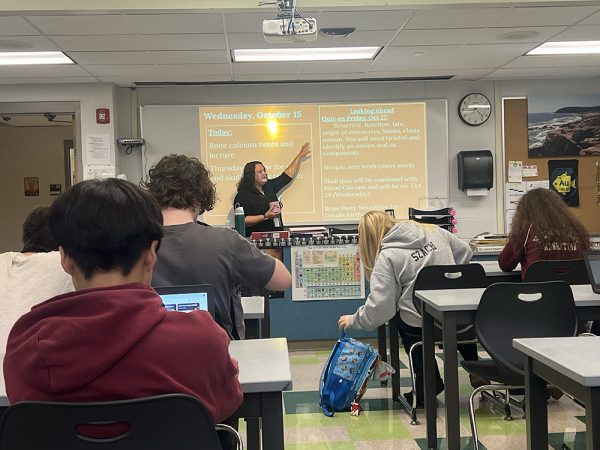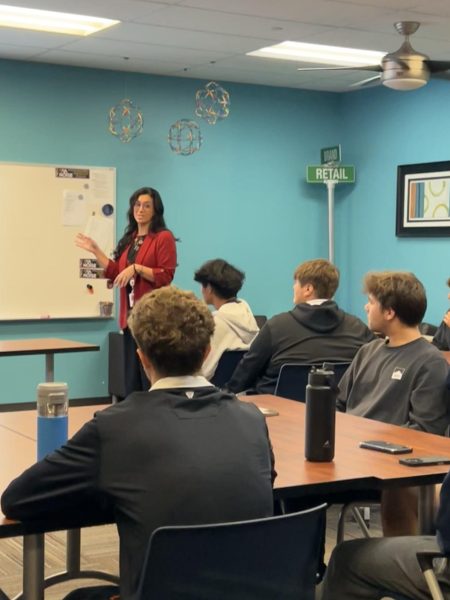Students to Take AP Exams at Home This Year

strngwrldfrwl from Japan via Wikimedia Commons
With school buildings empty, the College Board has adapted exams for an at-home format.
The College Board announced adjustments to this year’s AP exams on Friday, April 3 in response to school closures due to the COVID-19 pandemic.
The announcement stated that exams will be shortened to 45 minutes, and that students can take exams at home on any device they have access to such as a computer, tablet or smartphone.
Students also have the option of writing their responses by hand and submitting a photo of their work. Each AP subject exam will be given worldwide on the same day and time, between May 11 and 22, according to a revised schedule.
AP coordinator Liz Osicki thinks the College Board offered the best solution given the circumstances.
“The only other option was to cancel,” she wrote in an email. “They surveyed students, and students wanted to take the test and earn the credit they might earn in college. It’s the best possible solution to a very difficult situation.”
On test day, students will need to access the online testing system 30 minutes early to get set up, will have 45 minutes to take the exam and will have an additional five minutes to upload their work.
All the questions will be free responses, and the exam content will only cover what most schools have taught by early March.
Each AP student will be required to verify their identity and confirm that the work they have submitted is their own.
In addition to the testing dates in May, the College Board is offering makeup testing dates being between June 1-5.
Osicki hopes that the adjustments will be good for students.
“It will be interesting to see how taking a high stakes exam like an AP test in the comfort of your home might affect performance – whether positively or negatively,” she wrote.
Students expressed a variety of views on the new format.
Junior Somin Jung is pleased with the adjustments.
“[The College Board] acted really quickly, and considering the time given, they did a good job of altering the tests for students,” Jung wrote.
Sophomore Amelie Cotta is happy that the College Board didn’t cancel the exam, but she feels that there could have been another alternative in receiving AP credit.
“…You can’t just cancel the exam,” she wrote. “Although, personally, I would have rather them just take our grade in the class and evaluate whether or not we get AP credit because usually if you’re doing terribly in the class, you’re not going to do great on the exam.”
Junior Emily Fan feels that modifying the exams was the lesser of bad options.
“It may have been better to cancel exams,” she wrote. “…Since it is impossible to…determine where every single AP class is in terms of curriculum, but completely canceling would take all the time spent in class and put it down the drain.”
Fan is pleased to be taking the test online rather than in person.
“I would not want to put my health at risk [at] this time,” Fan wrote.
“[Taking the exam at home will be] safer for students health-wise to minimize contact,” she added.
Jung sees both advantages and disadvantages to taking AP exams at home.
“Since we’re taking them at home, we are avoiding the risk of infecting each other,” Jung said. “[However,] students who have already taken AP tests are familiar with the setting at school.”
“Taking the tests at home could mean [some] students might not have the most optimal testing environment,” she added.
Osicki also sees challenges in the way the AP exam will operate.
“If a student experiences technical difficulties, that will obviously be a problem,” she wrote. “They will have one more opportunity to take the test during the make up window, but if there are technical difficulties that week, there are no other options for retaking.”
“In addition, they are offering them at the same time world-wide,” she added. “So there are students in other countries who will have to wake up and take their exams at 3 am!”
Students also have mixed views regarding the option to write responses by hand.
“It depends on the class…” Fan wrote.
“I would like to type just because it’s faster; however, in Spanish you need accents on a lot of things, so I’m not sure how that would work,” Cotta wrote.
Certain subjects like AP Art and Design or AP Computer Science Principles will require students to turn in portfolios on May 26.
The College Board is also offering a full refund to students who opt not to take the 45-minute exam.
Cotta wondered whether cheating would be a problem, given the lack of formal proctoring.
“Honestly I don’t know if this exam is fair to evaluate whether you get AP credit,” she wrote.
Osicki believes that removing multiple choice questions helps with the security of the exam.
“The online setup prevents cheating,” she wrote. “Everything is open book and open note, so having free response questions only allows you to demonstrate your understanding of what you have learned and your ability to apply it.”
“It also reduces the memorization you [have to] do for multiple choice questions that is not usually retained after the test,” she added.
“I think given the circumstances, they had to figure out a way to still allow students to take the tests and potentially earn college credit, and this is the only fair way to do it,” Osicki continued. “They had very little time to set this up and figure out how to prevent cheating (which happens even when they hold the standard paper/pencil tests), so the free response made cheating a non-factor.”
AP economics teacher Pam Ogilvy sees challenges for her students on the shortened exam.
“The free response questions are going to be so much more focused and could completely avoid content that we’ve worked on all semester,” she wrote. “I often see the multiple choice as the great equalizer on the AP econ tests…and I’ll have to shift my focus in the coming weeks.”
Students taking an AP world language and culture class will complete two spoken tasks on the exam.
AP Spanish teacher Daria Cayne has concerns about this.
“Many students are not as strong verbally in Spanish as they are in the other areas,” she said. “This new exam seems biased towards native speakers who already possess these verbal skills, and would not have had to learn to speak fluently like almost ALL of my students have.“
“I can’t think of any benefits [to there being no multiple-choice offered on the AP Exam],” Cayne added. “My students have been practicing all year long and a few multiple-choice questions would have supported this learning. However, [textual and audio analysis] can be challenging for students who are not native speakers, so they may be lucky in the fact that they don’t have to stress about [that] now.”
Cotta does not mind the new format of the exam.
“We won’t have to do a big section of the test which is texts and audios,” she wrote. “So [now] the exam is much shorter and all we have to do is talk…”
Jung doesn’t mind completing only free response questions on the AP Exam, but she can see the problems that other students might have.
“I don’t mind, but I do feel that I have to shift gears now to just solving free response questions, which might be challenging,” she wrote. “[The test may also be challenging for students] who are simply better at multiple choice than free response questions, and there are those who practiced a lot of multiple choice for the tests.”
This year’s exams will be open notes, but the College Board stated that the exam is designed to prevent points being earned for answers found in textbooks or online.
The College Board explicitly states that students may not communicate with others during the exam. Students who do so will be blocked from testing, or their AP scores will be canceled. Their high school, colleges, and other organizations will also be notified about the cancellation.
Additionally, they will be able to detect cheating with a range of digital security tools and techniques such as plagiarism detection software and post-administration analytics. They will also allow AP teachers to spot inconsistencies with students’ known work.
Ogilvy commented on the College Board’s security protocols.
“Cheating is always a concern,” she said. “They are fine with kids looking through notes and PowerPoints, but I am fearful [that some kids might] either…have someone else take the exam for them or…get on a group chat to cheat.”
“I also think kids may have technology problems, and if they are unable to upload the answers within a five-minute window, they will not be graded,” she added.
Cotta also questioned the security and fairness of the exam.
“It is hard to make sure people are [taking the exam] fairly….[S]ome people live with people who speak Spanish at home or…you can access Google on another device.”
Ogilvy also sees benefits in the way the College Board is handling the exam.
“At first I was nervous, but after [the April 2nd College Board] webinar I feel better,” she wrote. “Teachers will be able to see the questions AND participate in evaluating responses (I will get to see [the student’s] work to ensure it’s [the student’s] and not copied). I also like that so much of what is going on in the world could be tied into these AP Econ exams…it could be beneficial.”
“If kids have a solid understanding of the graphs (which I am confident they do/will), the FRQ could be an absolute breeze,” she added. “It’s going to be more conceptual and less rote memorization.”
Oglivy and Cayne are both confident that their students will do well on this year’s test.
“My kids do incredibly well overall, and if they stay on the path of hard work and dedication to the class, I don’t see any change there,” Ogilvy said.
“[The students] have scored very well, but it is hard to compare with the multiple-choice sections because they are graded differently,” Cayne said. “However, the writing sections are traditionally where my students score the best…”
Students who don’t have access to the internet or a device can submit a form to the College Board to access mobile tools or connectivity.
The College Board also posted online content on their youtube channel where students can watch free AP review lessons delivered by AP teachers.
Students can also access free, optional student practice for most courses, available on AP Classroom.
“I am pleased that the College Board is offering [AP review lessons]-anything is better than nothing!” Cayne wrote.
Cotta stated that she hasn’t looked into the AP review sessions because she already feels prepared.
“I’m probably not going to try them out just because my teacher gives us enough review,” she wrote.
Fan has watched a few of them.
“I have only watched a handful…of the videos… but I still believe there is a difference between virtual learning and face to face learning,” she wrote. “…Learning on a screen doesn’t help as much as it could.”
Ogilvy and Cayne appreciate the way the College Board has handled the COVID-19 quarantine.
“Kids have worked so hard all year. It would have been a shame to deny them the ability to earn college credit,” Ogilvy wrote.
“[The new AP exam format] has reduced the type of preparation that we have to do before the exam and allows us to be laser-focused on the two areas that will be assessed,” Cayne wrote.
Ogilvy and Cayne explained how they will prepare their students for the exam.
“We will keep doing what we have been doing,” Cayne wrote. “How I help students prepare has worked for past students, so I will continue with what has worked before, and I remain confident that my students will perform to the best of their abilities.”
“I will shift my focus on free response questions and practice problems and away from multiple choice to ensure they have the tools they need to succeed,” Ogilvy wrote.
Some things are not changing: AP exams will continue to be scored on a 1-5 scale. The College Board stated that they are confident that colleges will continue to give AP credit for the exams, and AP exam scores will be released as close to the usual July timeframe as possible.
Fan is unsure whether she will be taking the AP exam.
“Currently…I have no idea if I am going to be taking an AP test,” she wrote.
“I feel that the abridged tests will give less reason for colleges to take them seriously,” she added. “I am concerned that even if I do take these exams I won’t get the credit.”
Osicki recommends that students still take the AP tests.
“I see no harm in taking the test, especially since, as I mentioned, you get to take it from the comfort of your home with your books and notes available to you,” she wrote. “Worst case scenario, you don’t earn the needed score to earn college credit, but you may very well be able to earn the credit and transfer it toward a four year degree.”
“It would be a shame to work this hard over the year and not have anything to show at the end of it,” she added.
There is no evidence that colleges are planning not to give credit for this year’s tests. Jay Matthews, education columnist for the Washington Post, argues that the College Board decision offers cover to colleges for their own COVID-19 adjustments.
The International Baccalaureate program, which is similar to AP, is cancelling exams entirely this year and offering credit based on students’ class performance.
Cotta stated that she will be taking the AP exam.
“I still paid for it so I’m still going to take it.”
Ogilvy and Cayne also stated that they recommend that students still take the AP exam.
“TAKE THE TEST! What do you have to lose? With all of the accommodations, why retreat now?” Cayne wrote.
“10000000000% take them this year,” Ogilvy wrote. “I think the College Board will be very forgiving.”

Brooklyn Hollimon (she/her) began writing for the Beachcomber in the spring of 2019. She enjoys covering school and community events. Outside of the Beachcomber,...





![“My parents have always said that education is important. My parents are Chinese immigrants, I'm Chinese American, [and that's a] value that has always been ingrained in our community,” said Senior Lyndia Zheng, pictured with Tony Zheng](https://bcomber.org/wp-content/uploads/2025/10/DSC_4244-600x400.jpg)




